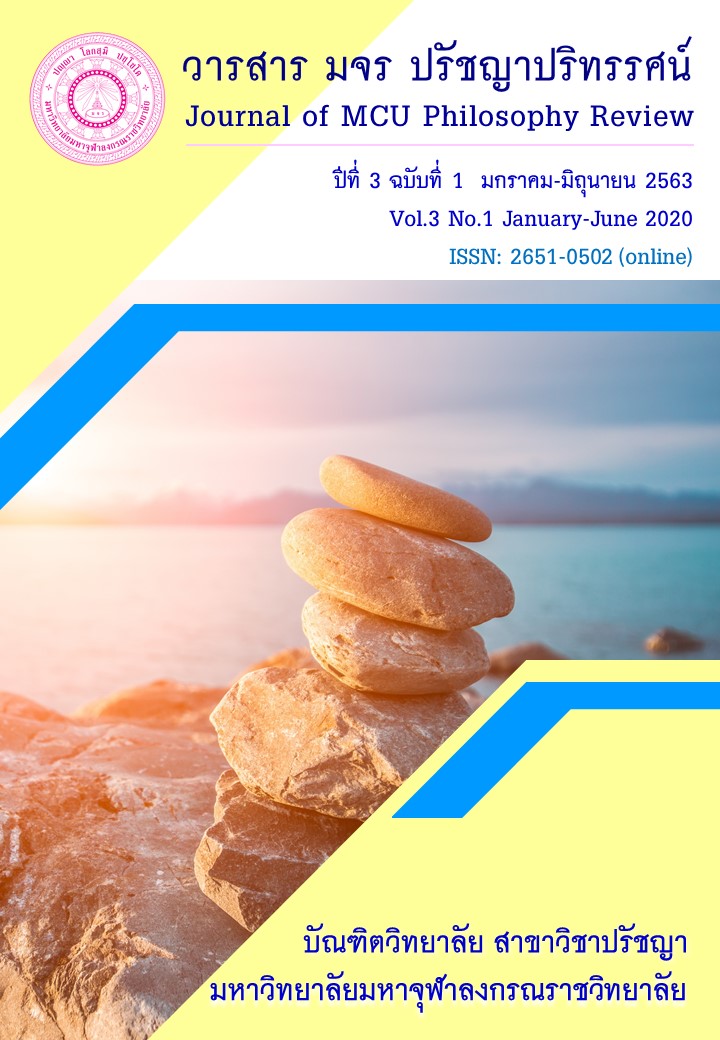An Analysis of the concept of Sangha’s Act, 2505 B.E. that influenced on the development of Thai society
Main Article Content
Abstract
In this article, an attempt was purposely made to study the concept of Sangha’s Act, 2505 B.E. and to analyze it that influenced upon the development of Thai society. This is a documentary study done by studying books and related articles. The study showed that the Sangha’s Act is the essential factor in the management of Sangha organization where patronage and protection of Buddhism including Sangha administration would be expected leading to the propagation of Buddhism resulting in the development of mind and wisdom whereby the Sangha’s protection of the Order and Dhamma could be properly made.
As far as the analysis of the mentioned Act is concerned, it is found that in the development of Thai society the later development and amendment of the Act are principally depended upon it as the primary source. In this respect, it is conditioned that the Sangha’ Act, a revised version of 2535 B.E. appears in the Section of fifteen ter (1) and (3) and (5) of Supreme Sangha Council Order, a version of 23 (2541 B.E.) that “Sangha’ s Activities” comprise of obligation or duty concerning with the protection good order, administration, ordination (rule), controlling, and promotion of education, public education, propagation of Buddhism, public welfare, and public support. Since then, such Sangha’s six obligations prescribed by the law turn to become the Sangha’s important mechanism in the development of Thai society both in mind and materiality.
Article Details
บทความที่ได้รับการตีพิมพ์เป็นลิขสิทธิ์ของวารสาร มจร ปรัชญาปริทรรศน์
ข้อความในบทความที่ได้รับการตีพิมพ์ในวารสาร ถือเป็นความรับผิดชอบของผู้เขียนบทความ และข้อคิดเห็นนั้นไม่ถือว่าเป็นทัศนะและความรับผิดชอบของกองบรรณาธิการวารสาร มจร ปรัชญาปริทรรศน์
References
นิรันดร์ จงวุฒิเวศย์. (2534). ทฤษฎีและแนวความคิดเกี่ยวกับการพัฒนาชนบท ใน เอกสารการสอนชุดวิชาการพัฒนาชุมชน. พิมพ์ครั้งที่ 8. กรุงเทพมหานคร: มหาวิทยาลัยโขทัยธรรมาธิราช.
นิรันดร์ จงวุฒิเวศย์ และพูนศิริ วัจนะภูมิ. (2534). ทฤษฎีและแนวความคิดเกี่ยวกับการพัฒนาชนบท ใน เอกสารการสอนชุดวิชาคหกรรมศาสตร์กับการพัฒนาชุมชน. พิมพ์ครั้งที่ 2. กรุงเทพมหานคร: มหาวิทยาลัยโขทัยธรรมาธิราช, 2534.
ชาเลือง วุฒิจันทร์. (2525). การพัฒนากิจการคณะสงฆ์และการพระศาสนาเพื่อความมั่นคงของชาติ. กรุงเทพ มหานคร: วิทยาลัยป้องกันราชอาณาจักร.
ดนัย ปรีชาเพิ่มประสิทธิ์. (2558). รายงานวิจัยเรื่องการวิเคราะห์ข้อเด่นข้อด้อยขององค์การและกระบวนการบริหารจัดการองค์การพระพุทธศาสนาของประเทศไทยในเชิงประสิทธิภาพด้านคุณค่าต่อพระพุทธศาสนา. กรุงเทพมหานคร: ศูนย์พุทธศาสน์ศึกษา จุฬาลงกรณ์มหาวิทยาลัย.
พิทูร มลิวัลย์ และไสว มาลาทอง. (2542). ประวัติศาสตร์พระพุทธศาสนา. กรุงเทพมหานคร: โรงพิมพ์การศาสนา.
พระธรรมปิฎก (ป.อ. ปยุตฺโต).(2543) ความสำคัญของพระพุทธศาสนาในฐานะเป็นศาสนาประจำชาติ. พิมพ์ครั้งที่ 10. กรุงเทพมหานคร: สหธรรมิก.
พระราชวรมุนี (ประยุทธ์ ปยุตฺโต). (2530). ทางสายกลางของการศึกษาไทย. พิมพ์ครั้งที่ 2. กรุงเทพ มหานคร: คณะศึกษาศาสตร์ มหาวิทยาลัยเกษตรศาสตร์.
พระมหาสุระพงษ์ สุรวํโส (สีหมอก). (2555). ภาวะผู้นำของพระสงฆ์ในการบริหารการพัฒนาชุมชน. วิทยา นิพนธ์นี้เป็นส่วนหนึ่งของการศึกษาตามหลักสูตรศิลปศาสตรมหาบัณฑิต (การบริหารการพัฒนาสังคม) คณะพัฒนาสังคมและสิ่งแวดล้อม, สถาบันบัณฑิตพัฒนบริหารศาสตร์.
ยุวัฒน์ วุฒิเมธี. (2526). การพัฒนาชุมชน จากทฤษฎีสู่การปฏิบัติ. กรุงเทพมหานคร: บากกอกบล็อก.
วริยา ล้ำเลิศ. (1/2559). เอกสารประกอบการเรียนการสอนวิชากฎหมายกับการพัฒนาชั้นสูง (นด. 600) หลักสูตรนิติศาสตรดุษฎีบัณฑิต. คณะนิติศาสตร์ สถาบันบัณฑิตพัฒนบริหารศาสตร์ (NIDA).
สนธยา พลศรี. (2547). ทฤษฎีและหลักการพัฒนาชุมชน. พิมพ์ครั้งที่ 5. กรุงเทพมหานคร: โอเดียนสโตร์.
สมศักดิ์ ศรีสันติสุข. (2525). สังคมไทยแนวทางการวิจัยและพัฒนา. ขอนแก่น: มหาวิทยาลัยขอนแก่น.
ราชบัณฑิตยสถาน. (2538). พจนานุกรม ฉบับราชบัณฑิตยสถาน. พิมพ์ครั้งที่ 5. กรุงเทพมหานคร: อักษรเจริญทัศน์.
สำนักงานคณะกรรมการกฤษฎีกา. (2561). พระราชบัญญัติคณะสงฆ์ พ.ศ.2505. ฉบับออนไลน์. สืบค้นเมื่อวันที่ 7 เมษายน 2563 .จาก http://web.krisdika.go.th/data/law/law2/%A401/%A401-20-9998-update.pdf.


